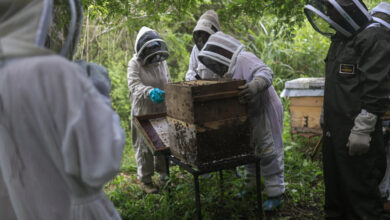Being Kind to Yourself Ensures Greater Well-Being
The way we speak to ourselves can shape our self-perception. For this reason, it's essential to cultivate compassion and loving-kindness for oneself.

The Woman Post | Carolina Rodríguez Monclou
Listen to this article
Awaken Insight is a community founded by Nada, an expert in Conscious Living, Personal Growth, and Spirituality. Awaken Insight's different spaces promote critical thinking and self-examination, leading to self-reflection and a deeper understanding of oneself. Here are some tips by Nada to cultivate self-compassion and eliminate negative self-talk.
Nada talks about how we can be hard on other people sometimes by being judgmental, condemning, and inconsiderate. But there's often no one that we treat as unkindly as ourselves. Think about how harshly we criticize ourselves daily for the smallest of mistakes and shortcomings.
It's alarming how much we judge ourselves for our failures or for the ways that we don't measure up to some perceived standard.
In a world where there are plenty of other people to criticize, judge, and treat us poorly with disrespect and contempt, what we often need is someone to care for us. Someone gentle and forgiven that reminds us of our value, virtues, and strengths.
Too often, we seek that person outside of ourselves without realizing that we can be that person because no one is there with you as often as yourself.
How can we be kinder to ourselves?
According to Nada, the thing about compassion is that it doesn't require perfection. "It's imperfect people that need compassion the most," the expert assures.
Part of being human is making mistakes, so we need to learn how to forgive ourselves, which means having sympathy for someone in distress and the desire to alleviate that suffering. Nada describes it as "a feeling of caring and kindness."
Also read: IS YOUR MENTAL HEALTH AFFECTED BY THE PANDEMIC?
To achieve this, we should recognize that we are worthy of love, kindness, and forgiveness despite our imperfections and darkest moments.
Learn to shift your focus
Instead of focusing on what we did wrong, Nada recommends focusing on improving or correcting ourselves. Whatever happens, all we need is a little understanding and compassion. Try this exercise:
Imagine that someone you care about comes to you and says, "I feel there's something wrong with me; I haven't accomplished anything with my life." What might you say to that person? Chances are, you would probably tell them something reassuring or encouraging. You would remind them that we all make mistakes, or you might remind them of some of their best qualities. You might console them or only listen to them with understanding. So the question is why we do not speak to ourselves in this way and what might happen if you did?
Somewhere along the way, your inner voice got drowned out. We need to reclaim our voice, dignity, and worthiness. These things have always been there all along. But they were buried beneath all the limiting beliefs that we've collected from outside ourselves. Nada claims, "all of that needs to go, and it starts by speaking from compassion and being all the things that we feel that we need most from others."
So every time you catch yourself in this pattern of negative self-talk, take a step back and see yourself as you would someone you deeply care about. Remember you deserve the same compassion you extend to others. From now on, choose not to be hard on yourself.




